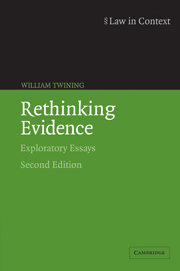Book contents
- Frontmatter
- Contents
- Preface
- Acknowledgements
- List of abbreviations
- Table of cases
- 1 Introduction: the story of a project
- 2 Taking facts seriously
- 3 The Rationalist Tradition of evidence scholarship
- 4 Some scepticism about some scepticisms
- 5 Identification and misidentification in legal processes: redefining the problem
- 6 What is the law of evidence?
- 7 Rethinking Evidence
- 8 Legal reasoning and argumentation
- 9 Stories and argument
- 10 Lawyers' stories
- 11 Narrative and generalizations in argumentation about questions of fact
- 12 Reconstructing the truth about Edith Thompson the Shakespearean and the jurist
- 13 The Ratio Decidendi of the Parable of the Prodigal Son
- 14 Taking facts seriously – again
- 15 Evidence as a multi-disciplinary subject
- Bibliography
- Index
1 - Introduction: the story of a project
Published online by Cambridge University Press: 15 December 2009
- Frontmatter
- Contents
- Preface
- Acknowledgements
- List of abbreviations
- Table of cases
- 1 Introduction: the story of a project
- 2 Taking facts seriously
- 3 The Rationalist Tradition of evidence scholarship
- 4 Some scepticism about some scepticisms
- 5 Identification and misidentification in legal processes: redefining the problem
- 6 What is the law of evidence?
- 7 Rethinking Evidence
- 8 Legal reasoning and argumentation
- 9 Stories and argument
- 10 Lawyers' stories
- 11 Narrative and generalizations in argumentation about questions of fact
- 12 Reconstructing the truth about Edith Thompson the Shakespearean and the jurist
- 13 The Ratio Decidendi of the Parable of the Prodigal Son
- 14 Taking facts seriously – again
- 15 Evidence as a multi-disciplinary subject
- Bibliography
- Index
Summary
Once upon a time a jurist in mid-career decided that the time had come to test and explore the implications and applications of some of his more general ideas at less abstract levels. The starting-point was an interest in ‘broadening the study of law from within’ as part of a conception of the discipline of law as an intellectual activity primarily concerned with the creation and dissemination of knowledge and critical understanding within ‘legal culture’.
The first step was to select a traditional field that seemed ripe for rethinking. There were several candidates. Torts, which he had taught for several years and which was in process of being deconstructed and redistributed; Contract, which was coming to be perceived almost as the paradigm or test case of legal scholarship; Land Law, on which several colleagues had done some promising ground-clearing work without having yet established a clear path out of the thickets of feudal arrangements and medieval doctrine; and Evidence, which had some intriguing ancestors in Bentham, Wigmore, Thayer and Frank, but which seemed to have been going through a somewhat stagnant phase in recent years.
The choice of Evidence was sealed by an epiphanic moment. In 1972, during a heated debate about proposed reforms of Criminal Evidence, Sir Rupert Cross, the leading English evidence scholar of the post-war era said: ‘I am working for the day when my subject is abolished.’ This was provocative at several levels.
- Type
- Chapter
- Information
- Rethinking EvidenceExploratory Essays, pp. 1 - 13Publisher: Cambridge University PressPrint publication year: 2006

